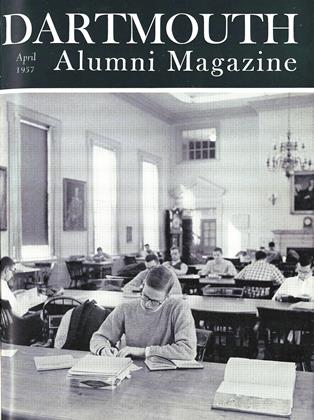THE Faculty has just committed itself to a spanking new curriculum, and the College shifts, in September 1958, to a three-term, three course program. We do not here purpose either description or discussion except to express our conviction that change is usually good, whether it's good or bad. What does concern us is a modest share in the obligation to advertise College procedures in flyers and instruction sheets directed to publics that range from the parents of an imminent male heir to the tottering but charitable octogenarian - not to mention a couple of hundred overseas branches of the U. S. Information Agency and some 950 jealous Deans of sister institutions.
The chief medium of dissemination of the facts of academic life is the Dartmouth College Bulletin, an annual series of catalogs and announcements that maintains a semblance of continuity to conform with postal requirements in Section nog of the Act of October 3, 1917. In this series, the College must be constantly alert to keep abreast or ahead of the times, to eschew contradictions, and to avoid the enticing temptation to prepare copy by clipping and pasting last year's dicta. It was this last obligation that emboldened some of us, several years ago, to delete from the catalog the assertion, hallowed by a quarter century of annual repetition, that the Hanover Inn is "lighted by electricity and heated by steam."
One number of the series, the General Information Bulletin, an illustrated and informal description of the College sent in response to inquiries about admission, calls for an especially thoughtful approach; and since next summer's issue is beamed at the Class of 1962 - the first to bear the full brunt of the revised curriculum and calendar a thorough tuning-up is in prospect. This booklet is the advance pitch to a potential market, and must try to impose a convincing sales argument without debasing the charm and dignity of the institution to the typographic level of the brochure of a high-class summer camp. Current efforts are directed toward sharpening the presentation to give an accurate picture of today's Dartmouth, to avoid overselling, and to be realistic in appraising the current status of our oft-vaunted splendid and rugged isolation. Illustrations have to be kept both informative and fresh, and while Dartmouth Row and the Baker Tower have attained an ageless and symbolic significance, we cannot cling to pictures of Jack Bowler and John Carleton going tandem off the old ski jump or of Bubby Bartlett conducting a Quantitative lab in Culver Hall. Undergraduate advice on the G.I.B. is "more babes and less 'Zum, zum, zum, zum, zum, zum, zum.'"
Regulations and Courses is what most colleges would (and do) call the Catalog. This is the official list and description of course offerings and the official list (without description) of the faculty that superintends them. It also contains miscellaneous rules, admission processes, and the requirements for the degree. It seems almost impossible to make some items legally foolproof and still comprehensible, but perhaps, with a new deal and an agonizing reappraisal in the offing, a greater degree of simplicity can be attained. Some progress has already been made. R. & C. no longer states "Course distinctions shall be retained to such an extent as may be necessary to fit the existing machinery of the College...," since nobody knows what it means. Ruthless excision has been practiced on an 87-word sentence about special concessions (made in two or three instances annually) to upperclass ROTC students, officially accepted as candidates for Thayer or Thayer-Tuck, who need a sixth course through no prior personal dereliction. And the History Department has graciously agreed that future advertisement of the consecutive courses, History 1 and 2, will not give double coverage to the year 1714, even though it witnessed the death of Queen Anne and the establishment of Fort Paducah.
Arguments with the Third Assistant Postmaster General, the difficulty of finding universally acceptable green covers, and other trivia are part of a different and too lengthy story. Suffice it to say that the committing to cold type of even the bare skeleton of the procedures of education is an education in itself, and that the College endeavors to present comprehensive and comprehensible information in Bulletins that do not look as though they had been printed with marshmallows on paper towels.
 View Full Issue
View Full Issue
More From This Issue
-
 Feature
FeatureA New Educational Program
April 1957 -
 Feature
FeatureNever Say Die or Adversity Foiled the Story of 100 Years of Rowing
April 1957 By CLIFFORD L. JORDAN '45 -
 Feature
FeatureAlumni to Honor Richard Hovey
April 1957 -
 Feature
FeatureMemories of Hovey
April 1957 By EDWIN O. GROVER '94 -
 Class Notes
Class Notes1918
April 1957 By ERNEST H. EARLEY, RICHARD A. HOLTON -
 Class Notes
Class Notes1931
April 1957 By JOHN H. RENO, WILLIAM F. STECK
BILL McCARTER '19
-
 Article
ArticleThe Hanover Scene
February 1953 By BILL McCARTER '19 -
 Article
ArticleThe Hanover Scene
November 1954 By BILL McCARTER '19 -
 Article
ArticleThe Hanover Scene
December 1956 By BILL McCARTER '19 -
 Article
ArticleThe Hanover Scene
June 1957 By BILL McCARTER '19 -
 Article
ArticleThe Hanover Scene
March 1958 By BILL McCARTER '19 -
 Article
ArticleTHE HANOVER SCENE
MAY 1959 By BILL McCARTER '19







